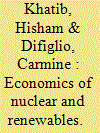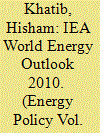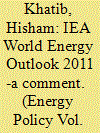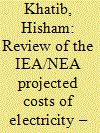| Srl | Item |
| 1 |
ID:
149953


|
|
|
|
|
| Summary/Abstract |
This paper provides an assessment of the economic challenges faced by both nuclear power and “new” renewable electricity technologies. The assessment reflects the need to incorporate new renewables into power grids and issues faced in dispatching power and their effect on traditional electricity technologies as well as the need for transmission extension and/or grid reinforcement.
|
|
|
|
|
|
|
|
|
|
|
|
|
|
|
|
| 2 |
ID:
104914


|
|
|
|
|
| Publication |
2011.
|
| Summary/Abstract |
The World Energy Outlook 2010 is a comprehensive energy report issued by the IEA. It is rewritten annually to reflect the world's changing energy and economy realities; it also introduces new issues relevant to the energy sector. This year it dealt with Caspian Energy, Energy Poverty and Energy Subsidies. WEO is controversial in few aspects; it still promotes a 450 Scenario which has become out of reach. This year however it introduced a more realistic New Policies Scenario which will need a lot of good will and investments to accomplish. Governmental policies are going to chart future energy sector performance; increasingly this is becoming decided by non-OECD countries. A more pragmatic future energy outlook is needed to reflect developing countries priorities for growth and utilization of local resources and how to accommodate this with abatement priorities through energy efficiency measures and technologies.
|
|
|
|
|
|
|
|
|
|
|
|
|
|
|
|
| 3 |
ID:
115173


|
|
|
|
|
| Publication |
2012.
|
| Summary/Abstract |
There are increasing numbers of annual and periodical energy studies that look into future energy demand and sustainability issues. Among these the World Energy Outlook stands out as the most important futuristic energy study and analysis. The 2011 Outlook is in four parts and gives a full update of energy demand and supply projections to 2035. It analyses the possible evolution of energy markets under three scenarios. The core scenarios rest on common assumptions about macroeconomic conditions and population growth, while their assumptions about government policy differ. This year's Outlook offers an in-depth analysis of prospects for energy supply and use in Russia. It also provides an expanded assessment of the prospects for coal. It reviewed the future of nuclear energy after Fukushima, as well as the strategic challenges of energy poverty. Last it dealt with the important aspect of energy subsidies. In spite of its extensiveness and in depth analysis some of the Outlook assumptions and conclusions need careful analysis and review.
|
|
|
|
|
|
|
|
|
|
|
|
|
|
|
|
| 4 |
ID:
126811


|
|
|
|
|
| Publication |
2014.
|
| Summary/Abstract |
The MENA region is endowed with enormous resources of oil and gas, rendering it the world's richest region in this regard. Endowment differs from one country to another with few countries are almost dry; however the economic benefits proliferated to almost every country in the region. In spite of some doubts being cast about the amount of proven oil reserves, these with improved technology and new discoveries are increasing year after another. With no long term feasible alternatives to oil for transport and the increasing trade in LNG, the region's importance as a world's leading supplier of fossil fuels will continue for decades to come.
However, these favourable prospects hide many challenges facing the MENA region, among them is the difficulty in mobilizing investment funds for sustaining and increasing output to feed growing global demand. Growing local demand, due to the proliferation of subsides, is another worrying aspect that already caused few countries with modest resources to become oil importers instead of exporters, with larger exporters decreasing their surplus output. The region is also still mainly dependant on foreign technologies and skilled manpower. Regional cooperation in oil and gas networks and electricity interconnections is still modest.
The region has a long history of conflict; correspondingly it is a major importer of armaments which is increasingly eating a lot of its surplus income. With the political and social changes presently taking place in many MENA countries, due to the Arab spring and continuation of local conflicts, the sustainability of supplies from the region are increasingly a source of worry to MENA exporters and its many importers. It is also causing increasing involvement of the super powers in regional affairs.
|
|
|
|
|
|
|
|
|
|
|
|
|
|
|
|
| 5 |
ID:
098551


|
|
|
|
|
| Publication |
2010.
|
| Summary/Abstract |
This joint report by the International Energy Agency (IEA) and the OECD Nuclear Energy Agency (NEA) is the seventh in the long established series of studies into electricity generating costs. It presents the main results of the work carried out in 2009 for calculating the costs of generating baseload electricity. The study is quite comprehensive in covering almost all financial aspects facing investors in the electricity generating system. Therefore this study although useful, its usefulness lies in explaining methodologies, mentioning factors that affect investment and cost, educating planners and improving investment evaluation and planning methodologies, its resulting figures and cost comparisons are however controversial. Generation planning and investments are case and country specific, and should be studied correspondingly and as close as possible to the timing of decision making to take account of trends. Most likely such case specific results will differ from figures calculated in the study. Therefore we need to emphasize a key conclusion of the study which is "that country-specific circumstances determine the LCOE"; it is this that needs to be considered and not the results represented in the study.
|
|
|
|
|
|
|
|
|
|
|
|
|
|
|
|
| 6 |
ID:
150350


|
|
|
|
|
| Summary/Abstract |
The IEA/NEA recently issued their eighth edition of the Study on the “Projected Costs of Generating Electricity” – 2015 edition. The Study is mainly concerned with calculating the levelised cost of electricity (LCOE). The LCOE calculations are based on a levelised average life time cost approach using the discounted cash flow (DCF) method. The analysis was this year, and for the first time, performed using three discount rates (3%, 7%, and 10%). The LCOE can serve as a tool for calculating the cost of different generation technologies. However the Study's usefulness is affected by its narrow base of a limited set of countries that are not necessarily representative. It ignored the negative role of subsidies and did not provide a methodology for selective application of the discount rates and costing of carbon. The global power generation scene is changing. Generation growth in OECD countries has become very limited; simultaneously there is rapid growth of varying renewables (VRE) generation which needs special criteria for assessing its system cost. All this demands a rethinking of the application and usefulness of the LCOE in future generation planning.
|
|
|
|
|
|
|
|
|
|
|
|
|
|
|
|